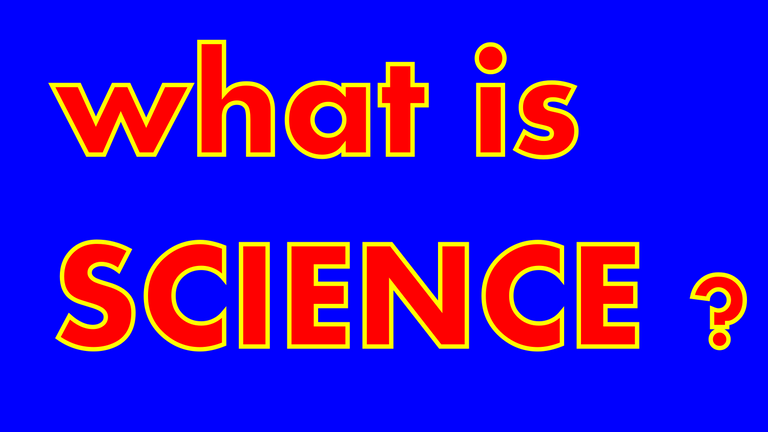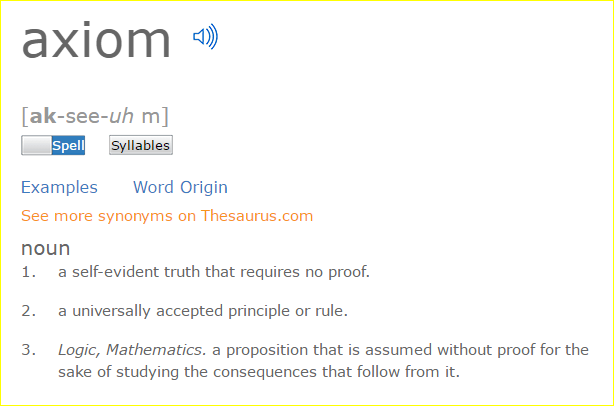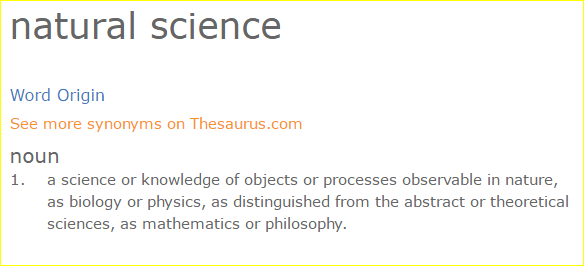
SCIENCE, sure! But what IS science already?
Many perceive that science is, in a sense, the "opposite" of religion: science tries to unravel the emergent story that is based on facts, whereas a religion will assume and build upon its own dogma. In that sense, science is the objective way to discern universal, all-encompassing objective truths as it is independent of subjective beliefs, whereas religion could, in principle, build any story that will be in accord with its own foundations, established based on beliefs and assumptions.
But this definition is very lacking, and here is why:
Looking for formal definitions of science in dictionaries, scholars, books and online you will encounter diversity, but you will find that science is mostly about a state of knowing by systematically arranging bodies of facts and understanding the underlying natural laws.
Science is also about experiments, but not always: sometimes it is about theorizing and philosophy, and science also deals with religions. Why is that?
To discover why, let us use science on science, narrow down and expand on those definitions and you will see there are at least three distinct families of science: natural science, formal science and social science. So what are they about?
The social sciences (also known as "soft sciences") mostly deal with human life in relation to its environment, and also human interrelations (this explains the tag 'life' for this here post) so they deal with how humans live: history; sociology; parts of economics; psychology; criminology; and ethnographic and cultural studies are all social sciences. Here, mathematics and strict experimentation can be tricky, or unnecessary to borderline impossible to implement as the subjective human element is dominant and there is a lot of abstraction present, still this is considered science as the accumulated knowledge can be organized in a coherent way and, for example, human behavior can be catalogued and to some degree predicted. At times the subjectiveness of the observer combined with the elusiveness of the subject (e.g. the human soul and archetypes in psychology) further complicates issues because it invokes the subjective all too often.
(example definition from Merriam-Webster dictionary)
So, in social sciences assumptions are usually not invoked as those mostly have to do with observing and cataloguing, plus abstractions and generalizations ("the human race" or "this human population" or "this type of person") can be quite common.
The formal sciences mostly deal with logic (hence the tag 'mathematics'), therefore mostly deal with how humans think and speak. Here, mathematics will almost always be present, at least in the form of strict rules or logic, and there can be much abstraction and theory: mathematics (both arithmetic and elements of geometry); algebra and calculus; set theory; computer science; algorithm science; and languages are all good examples of a formal science. The equivalent of dogma is present in the formal sciences and is called axiom:
(example definition from dictionary.com)
As an example, there is no fundamental proof for the Euclidean geometry ("geometry" as it is mostly taught in schools) or any geometry really: instead, all is based on axioms such as "from a point outside of a line, one and only one parallel line can be drawn to that line": but there are geometries that lack this certain axiom and are based instead on the assumption that an infinite (or even zero) parallel lines can be drawn from a point outside of a line. However, all next steps on those geometries are perfectly logically connected to each other and contained within themselves, and as a result those alternative geometries are complete and function flawlessly.
(example definition from wictionary.org)
So, in formal sciences, the initial axiom and all initial assumptions are never proven: they are instead used as a given, and the rest of the story is built "bottom-up" through the use of logic, starting from those initial axioms and assumptions.
The natural sciences deal with the natural environment where humans exist (hence the tag 'nature'), and are only concerned with the objective natural world and its phenomena and processes. Here, observation and experimentation is at the core, and any and all formalism (such as mathematics or modeling) only comes later on and must be in accord with the initial observations, and never contradict them: experimentation is with regards to physical substances, and experiments are invented to be repeatable and verifiable. A single observation contradicting an established theoretical model of the natural world is therefore enough to falsify said model, and this is why theories and models for the natural world are constructed to be falsifiable through experimentation.
(example definition from dictionary.com)
So, unlike e.g. philosophy (a formal science), natural science sheds all subjectivity and is independent of beliefs and axioms: as a result, any claims regarding the objective truths of the natural world that the humans are embedded in stem from observable, testable, repeatable and verifiable facts, and NEVER on hear-say, speculation, authority or rumor.
Misinformed individuals will always encounter problems in their endeavor to be free, and this is why the tag 'freedom' was also chosen to accompany this post!
(disclaimer: new and clumsy steemit user here, and I will do my best to address all comments!)




Nice post, thanks for the follow, followed you right back @rishherbalist
@originalworks
To call @OriginalWorks, simply reply to any post with @originalworks or !originalworks in your message!
For more information, Click Here!
To enter this post into the daily RESTEEM contest, upvote this comment! The user with the most upvotes on their @OriginalWorks comment will win!Special thanks to @reggaemuffin for being a supporter! Vote him as a witness to help make Steemit a better place!
Science is anything which solves human real life problems and derives an alternative for the same :)
I hit the wrong key and posted early, so for an hour or so this post only had the first picture and one sentence. Sorry, I am new in this. I think your comment came before I edited it to what it is now (just making sure you are not missing it)
Congratulations @flatenough! You have completed some achievement on Steemit and have been rewarded with new badge(s) :
Click on any badge to view your own Board of Honor on SteemitBoard.
For more information about SteemitBoard, click here
If you no longer want to receive notifications, reply to this comment with the word
STOPCongratulations @flatenough! You have completed some achievement on Steemit and have been rewarded with new badge(s) :
Click on any badge to view your own Board of Honor on SteemitBoard.
For more information about SteemitBoard, click here
If you no longer want to receive notifications, reply to this comment with the word
STOPCongratulations @flatenough! You have completed some achievement on Steemit and have been rewarded with new badge(s) :
Click on any badge to view your own Board of Honor on SteemitBoard.
For more information about SteemitBoard, click here
If you no longer want to receive notifications, reply to this comment with the word
STOP